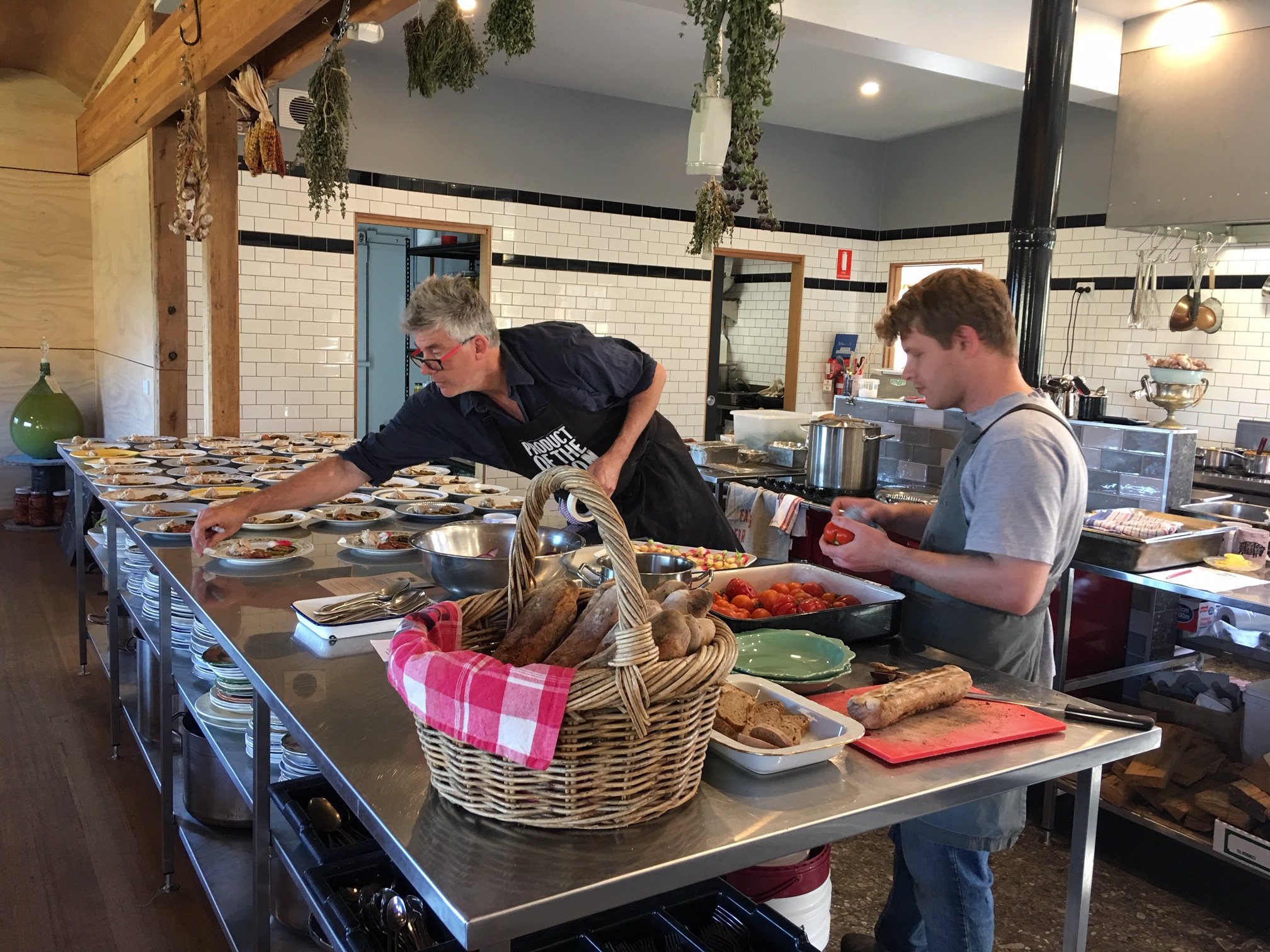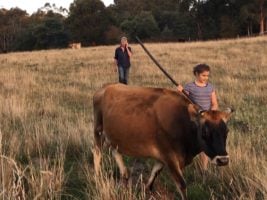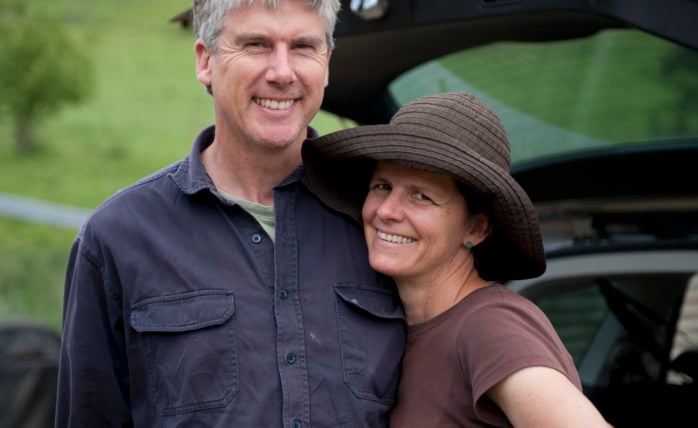Matthew Evans runs his family small business, Fat Pig Farm, near the Huon River in Southern Tasmania with his partner, Sadie Chrestman. The farm has a market garden, pigs and dairy cows. They’ve been building the business for nine years, and in 2016 launched a cookery school, produce store and restaurant serving their home-grown produce. Evans will be familiar to fans of his SBS TV show, Gourmet Farmer.
Like many small business owners across Australia, Evans and Chrestman have been forced to shut down their thriving business as part of the response to halting the spread of coronavirus. In a letter to his supporters today, Evans opened up about the heartbreak he’s felt shutting it all down, his worries about his loyal team and most importantly, on how to find hope when it seems to be lost.

Evans (centre) prepares lunch for guests at Fat Pig Farm.
Here’s what he wrote:
When it comes to facing the dozen or so staff we employ on a weekly basis, and telling them not only has our income dropped to zero, but we’re also going to be cash negative for the next several months? Pretty damned hard.
This is about our thoughts on life, the land and lurgies.
We’ve wanted to write about resilience since the fires burned near us in February 2019. Last year slipped away. The drought bit hard on the mainland. Fires started early in the season of 2019/20 on the big island, and flamed way too bright, tearing our hearts out as they did, fuelling anxiety about climate collapse and freaking out all those in its way, and all those of us who knew someone in its way.
So… let’s talk about resilience.
As the fourth horse of the apocalypse rides across the sky (after drought, fire and flood), we need to remember a lot of things.
A nation that stockpiles Panadol and fights over tinned goods, while medical workers worry about whether we’ll have enough ventilation machines doesn’t shower itself with glory. We need to recognise that our collective good is in our collective humanity. We don’t thrive in a vacuum, we thrive when we work in concert in the good times, and we should plan on that in times of crisis, too. So much of what we have to do now feels like an imposition, but staying at home, only going out for what are actually essentials, keeps our society safe.
Staying home has consequences. Our business, like so many, is buggered. We don’t want you to feel sorry for us – we’re in a very good starting place compared to others – but we wanted to explain how all this feels from the inside of one small farm, one small business.
You, our customers, have trusted us. Trusted us with your money and your hopes. We make you fork out ahead, on the basis that you trust us to grow and rear food for you. We then repay your trust with a long lunch on the farm, conviviality at the heart.
We have already grown the food for the next few months, it is already in the ground, or on the ground, fattening or ripening. But for the foreseeable future we can’t welcome you to our table. We can’t pour you a drink and help you forget about the outside world for a while.
We can’t show you our corner of the globe, and what we love about it. Our beautiful market garden, our fat free range pigs snuffling up this year’s windfall apples.
We will harvest that food. We will employ our great community to continue to tend plots, to preserve the spoils, to sell what we can in a way that allows us to keep Fat Pig Farm afloat.
What makes us vulnerable – that investment in a future that didn’t eventuate – also makes us resilient. It gives us what is important; nutrition, purpose, pleasure. We have to be flexible to survive the economic Armageddon, but we have the resources – human, vegetable, animal, and space – to be sound.
Not everybody has such luck.

Milking time at Fat Pig Farm
Many of you will look to the government to help in these times. As we should. And we will. But remember, for a moment, all those big multinationals that avoid tax. All those big companies based offshore who encourage us to buy online instead of at our local shops.
They have stolen money from the very people who need it most. And the vulnerable in society need it most right now. We can talk about fiscally responsible leaders, but if every dollar that used to be spent locally has gone offshore, or is sucked out of our economy never to be seen again, there’s less of a pie to share.
Now is the time to look at our systems and fix them. We all know people who think it’s quaint, a bit yokel-ly, and not sustainable to support local farmers. That economies of scale and agribusiness and Amazon are the only way forward. That it is just fine to send money overseas every time you buy a book, a pair of shoes, a glass of cider made from concentrate, a kettle. Every time you have home delivery or catch a ride.
It might take something like this to realise that spending that money close to home recycles that money close to home. Buying locally gives our neighbours, our town, our community, purpose. And when we give ourselves purpose, we give our kids, elderly and others hope.
But enough of the big picture. Let’s think of the right now. Of the human face of this crisis. Because that’s what came home to us this week; that every soul in our circle is affected by something way beyond their, or our, control.
When we talk of voluntary isolation, and social distancing, that doesn’t mean social isolation. Humans can and should interact, but for a short period, relatively, that might need to be across the farm fence or over the internet, not within each other’s reach.
What do we do in times like this?
Cook for each other. Care for each other. Read books. Write books. Write a love letter. Bake a cake. Stand apart when you tell jokes.
We will be able to sit at our tables once more with strangers, to break bread and build community through shared meals. That time isn’t right now. But it will be again.
In the meantime, talk softly to each other. Share what you have with those who can’t get what they need. Think of those who are older. Less firm. Less able, emotionally as well as physically. Offer soup. Call someone who lives alone. Quote poetry. Remember the beautiful things, store them away in your hearts and minds for when we may not have beautiful things in front of us.
It can feel like the ends of days. It’s not. It’s the beginning. A time to reassess what is important. Who is important. How community is built by us, not foist upon us, or something that only exists on Seachange.
This last week was pretty damn hard for Sadie and I. We faced defeat, faced betraying the people who helped make our farm, and helped make us, what we are.
I don’t know how we’ll be able to keep our immediate farm community buoyed financially. But we must find a way.
This week has also been the best week of our time together: Seeing the incredible goodness in the souls of our staff.
Being honest about our failings, our vulnerabilities, our strengths and our hopes, and having others do likewise, has brought a new vantage to what is coming. We know that at the other end of this lies a new place. A different phase. It may be altered in many ways.
But it will also be the same. It will have all the laughter, tears, pain, courage, joy and pleasure that humanity is capable of. There’s just a little tough time to get through in between.




















Trending
Daily startup news and insights, delivered to your inbox.